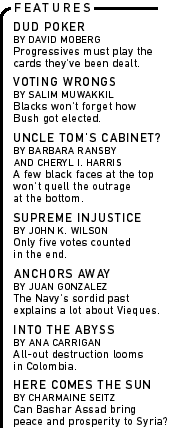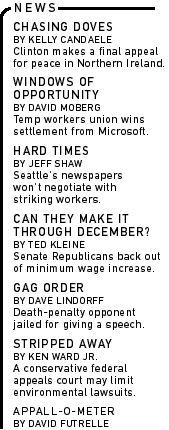 
|

|

|

|
| |
|
|
|
I was in Washington on December 1, on that long-ago chilly morning when eager-beaver legal observers awoke from sleeping overnight on the Supreme Court steps. People lined up to watch oral arguments in the first round of Bush v. Gore and talked breathlessly to NPR reporters about enduring cold winter hours to watch "history being made." A month later, the Supreme Court's holy status has taken a beating in some quarters. "The God that Failed" was the headline of The Nation's editorial on the December 12 verdict. "So much for states' rights," quipped the Washington Post's E. J. Dionne. The Rev. Jesse Jackson and AFL-CIO President John Sweeney noted "a disturbing irony" that the court used the 14th Amendment's equal protection clause to throw out some 185,000 disproportionately African-American votes for fear that a manual vote count might be unfair. The sense that the court broke with their judicial philosophy in a nakedly partisan move to select George W. Bush for president fueled the fury of Gore backers. "The Supreme Court has spent the last 50 years shaping equal-protection jurisprudence to redress history's racial horrors," former judge and MIT political science Professor Margaret Burnham wrote in the Boston Globe. "However ineffectual that civil rights project was, the court is now in vivid reverse." But this should have come as no surprise. When it comes to civil rights, the court's gears have been stuck in reverse for a decade. Since Clarence Thomas joined the court in 1991, the Rehnquist Five (with Justices Scalia, Kennedy and O'Connor) have accepted challenges to the federal government's right to enforce all sorts of laws. Specifically, they've challenged laws that offered recourse to victims of discrimination (women, the elderly, people with disabilities, ethnic minorities), usually coming down for states and against the federal government. Most recently, in United States v. Morrison, the 5-to-4 majority declared that a provision of the Violence Against Women Act which enabled women to sue in federal court was an overreach by Congress that "trespassed" on "states' rights."
|

